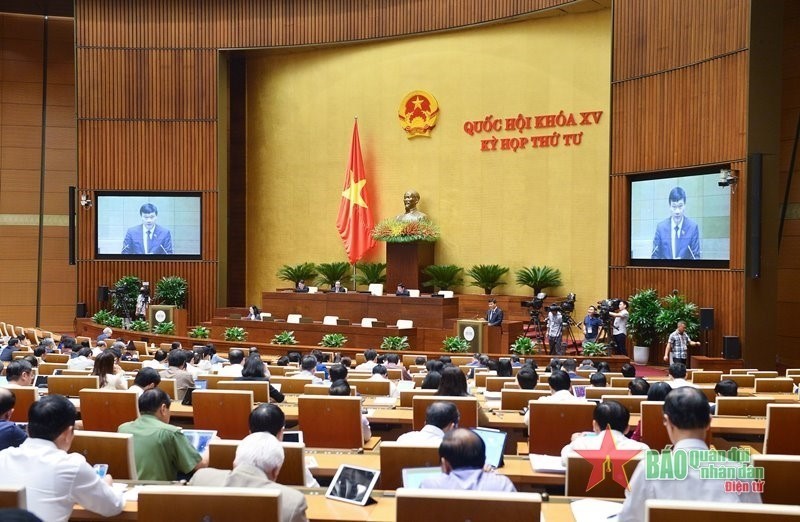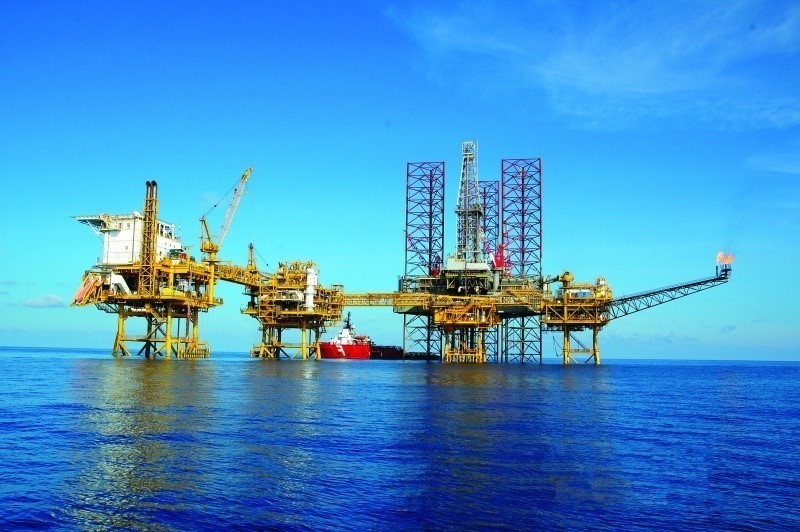
472 out of 475 NA deputies voted to approve Petroleum Law (revised)
Latest
 |
| The National Assembly voted to approve the Petroleum Law (revised). (Photo: People's Army) |
Chairing the voting session to pass the Petroleum Law (revised), National Assembly Vice Chairman Nguyen Duc Hai stated that the process of revising and adjusting the Law Project was carried out seriously. Accordingly, the Draft Law including 11 Chapters and 69 Articles will take effect from July 1, 2023.
Before the National Assembly presses the button, on behalf of the National Assembly Standing Committee, Chairman of the Economic Commission Vu Hong Thanh delivered a report on the explanation, acquisition and revision of the draft law and stated that, at the 4th session, the National Assembly had spent time discoussing the Petroleum Law (revised) at the hall.
| “The passage of the revised Petroleum Law with many breakthroughs is a necessary legal basis for more efficient exploitation of oil and gas resources. The revised Petroleum Law is expected to create an institutional impetus to help the oil and gas industry as well as the Vietnam Oil and Gas Group to step up activities of exploitation, exploration, search and bring the oil and gas industry to strong and sustainable development and at the same time contribute to protecting national sovereignty at sea”, said Le Manh Hung, General Director of the Vietnam Oil and Gas Group (PetroVietnam) after the revised Petroleum Law was passed. |
Regarding to 13 opinions of deputies at the legislative body’s 4th session, the National Assembly Standing Committee asked the agencies in charge of verificating and drafting and other related agencies to study the opinions and adjust the draft law, Thanh said.
He said that the draft has included regulations on the Prime Minister's decision on the operating mechanism for Petroleum fields, clusters, and lots. This is a new policy of the draft law with numerous groundbreaking provisions, which is a fundamental legal basis for more effective exploitation of oil and gas resources, leading to increased state budget revenue in the context that in the coming years, many oil and gas fields in the final stage of the field's life will turn to the full exploitation period.
The National Assembly Standing Committee suggested the Government study the opinions of the National Assembly deputies, direct agencies to continue completing this content in the draft Decree and review and promulgate other relevant sub-law documents, in which focuses on regulations to ensure the efficiency of exploitation activities and strict control of oil and gas operating costs.
 |
| The revised Petroleum Law including 11 Chapters and 69 Articles will take effect from July 1, 2023. (Photo: Petrovietnam) |
Relating to the State's policies on oil and gas; principles of conducting basic investigation on oil and gas as well as oil and gas activities, receiving opinions of National Assembly deputies, the draft included in Clause 3, Article 6 the principles of compliance with the provisions of Vietnamese law on “oil spill response”.
As for the issue of "national security" Clauses 2 and 3, Article 6 specified the with relevant laws on assurance of national defense and security; the issue of "energy security" has been specified in Clause 1, Article 5 that requires compliance with the provisions of relevant laws on energy planning.
Regarding the prohibited acts, the draft has added the act of taking advantage of the basic investigation on oil and gas and activities causing environmental pollution in Clause 2, Article 9 of the draft law.
Referring to the oil and gas contract, Article 31 of the draft law has been amended to stipulate 2 separate clauses (Clause 6 and 7) on the responsibilities of relevant entities for deciding the time to suspend the exercise of some rights and obligations in the oil and gas contract in two cases: (1) force majeure and (2) for reasons of national defense and security.
Regarding preferential policies in oil and gas activities, the Draft has technically edited in Clause 1, Article 67 to ensure the correct technical documents, and does not affect other contents of the Law on Corporate Income Tax when being implemented.
With regard to investment incentives and special investment incentives in oil and gas activities, the draft shall keep the amendments and supplements in Clause 3, Article 10 of the Law on Corporate Income Tax as submitted, not directly prescribe investment incentives and special investment incentives in oil and gas activities in the Law on Corporate Income Tax because it is associated with specific incentives specified in Article 53 of the draft Petroleum Law (revised).
Regarding the contractor's obligations, Chairman of the Economic Commission Vu Hong Thanh said that Clause 12, Article 59 stipulates the obligations of the contractor signing a contract. Accordingly, while choosing contractors to provide oil and gas services and goods they must first ensure the principles of competition, fairness, transparency and efficiency, and at the same time, be consistent with the oil and gas contract because the oil and gas contract only stipulates the general principles on this content and each investor has its own regulations on selection of contractors providing petroleum services and goods for petroleum activities.
As for the State management in oil and gas sector, the Draft Law only stipulates the responsibilities of the Committee for the Management of State Capital at Enterprises (Article 66) in association with the regulations on decentralization to the Members' Council of the Vietnam Oil and Gas Group in petroleum activities (Article 63), which is different from the regulations prescribed in the current Law on management and use of state capital invested in production and business at enterprises.
The Draft Law does not stipulate conditions on capital of the Vietnam Oil and Gas Group when transferring or receiving the rights to participate, as well as the responsibilities of the Committee for the Management of State Capital at Enterprises to comment on this content.
In addition to the above contents, the National Assembly Standing Committee has directed the agency in charge of verification, the drafting agency and relevant agencies to review the provisions of Article 69 on the transitional provisions and acquire and correct documents technically; submit to the National Assembly for consideration and decision.
| The Petroleum Law was born in 1993 as an important milestone marking the formation of the system of legal documents on oil and gas and was supplemented and revised in 2000 and 2008 to gradually improve. However, the international and domestic contexts have changed, greatly affecting the development of Vietnam's Oil and Gas Industry. During the implementation of oil and gas activities, a number of inadequacies and problems have arisen and have not been adjusted by the Petroleum Law and legal documents guiding the Law or regulations are inconsistent, overlapping with other legal provisions. Therefore, the operation of upstream oil and gas enterprises as well as the state management has encountered many obstacles. For the above reason, the Petroleum Law (revised) was passed with the provisions relevant to the new context in order to eliminate inadequacies and problems arising, and at the same time, it is necessary to create a more favorable legal corridor for investors, contributing to improving the investment environment in the oil and gas sector. The basic purpose of the development of the Petroleum Law (revised) is to perfect the petroleum legal framework, ensure the uniformity and consistency of the legal system in oil and gas activities, in line with the international agreements and international oil and gas industry practices. The Petroleum Law (revised) inherits the basic provisions of the current Petroleum Law, ensuring the stability and continuity of signed (currently effective) oil and gas contracts and agreements, and at the same time ensuring compatibility and synchronization with the current legal system (not in conflict or overlapping with other laws), international treaties to which Vietnam is a member and international oil and gas industry practices. |

























